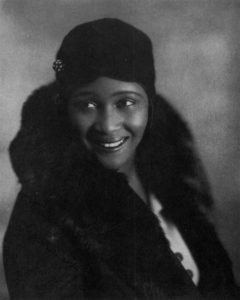
Victoria Spivey
On this date, in 1906, Victoria Spivey was born. She was a Black blues singer.
Born in Houston, Texas, Spivey began her recording career at age 19 and came from the same rough-and-tumble clubs in Houston and Dallas that produced Sippie Wallace. In 1918, she left home to work as a pianist at the Lincoln Theater in Dallas. In the early 1920s, she played in gambling parlors, gay hangouts, and whorehouses in Galveston and Houston with Blind Lemon Jefferson. Among the many influences on Spivey's life was Ida Cox, herself a sassy blueswoman, and taking her cue from Cox, Spivey wrote and recorded tunes like "TB Blues," "Dope Head Blues," and "Organ Grinder Blues" in the 1920s.
Spivey's other influences included Robert Calvin, Sara Martin, and Bessie Smith. Like so many other women blues singers who had their heyday in the 1920s and '30s, Spivey was not afraid to sing sexually suggestive lyrics, and this turned out to be a blessing nearly 40 years later in the sexual revolution of the 1960s and early '70s. She recorded her first song, "Black Snake Blues," for the Okeh label and then worked as a songwriter at a music publishing company in St. Louis. In the 1930s, Spivey recorded for the Victor, Vocalion, Decca, and Okeh labels and moved to New York City, working as a featured performer in several African American musical revues, including the Hellzapoppin' Revue.
She also recorded and was on the road with Louis Armstrong's various bands during this time. By the 1950s, Spivey had left show business and sang only in church. But by forming her own Spivey Records label in 1962, she found new life in her old career. As the folk revival began in the early 1960s, Spivey became an in-demand folk blues festival circuit performer. She also performed frequently in nightclubs around New York City.
Unlike others from her generation, Spivey continued her recording career until the 1970s, performing at the Ann Arbor Blues and Jazz Festival in 1973 with Roosevelt Sykes. Spivey was among the more influential blueswomen because she was around long enough to influence legions of younger women and men who rediscovered blues music. Spivey could do it all: she wrote songs, sang them well, and accompanied herself on piano, organ, and occasionally ukulele.
In 1970, the music publishing organization awarded Spivey a "BMI Commendation of Excellence" for her long and outstanding contributions to the many worlds of music. In 1976, she died soon after entering a hospital with an internal hemorrhage. Spivey is buried in Hempstead, New York.
Nothing But the Blues: The Music and the Musicians
Edited by Lawrence Cohn
Copyright 1993 Abbeville Publishing Group, New York
ISBN 1-55859-271-7